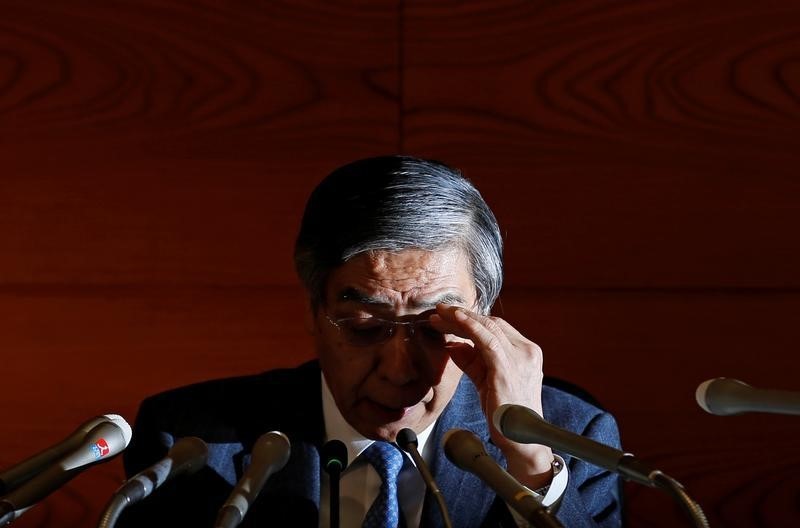By Leika Kihara
TOKYO (Reuters) - The Bank of Japan expanded stimulus on Friday by doubling purchases of exchange-traded funds (ETF), yielding to pressure from the government and financial markets for bolder action, but disappointing investors who had set their hearts on more audacious measures.
The central bank maintained its base money target at 80 trillion yen ($775 billion) as well as the pace of purchases for other assets including Japanese government bonds.
It also left unchanged the 0.1 percent interest it charges to a portion of excess reserves financial institutions park with the central bank.
The dollar fell more than a full yen on Friday at one point to as low as 102.825 and the Nikkei average tumbled nearly 2 percent, after the BOJ's decision fell short of expectations.
"The BOJ did not live up to expectations. I want to hear what BOJ Governor Haruhiko Kuroda has to say, but increasing ETF purchases makes no contribution to achieving 2 percent inflation," said Norio Miyagawa, senior economist at Mizuho Securities.
"The BOJ won't admit it, but it has reached the limits of quantitative easing and negative rates."
Indeed, the BOJ said it will conduct a thorough assessment of the effects of negative rates and its massive asset-buying programme at its next rate review, suggesting that an overhaul of its policy framework may be forthccoming.
At the two-day rate review that ended on Friday, the BOJ decided to increase ETF purchases so that its total holdings increase at an annual pace of 6 trillion yen, up from the current 3.3 trillion yen. The decision was made by a 7-2 vote.
By coordinating its action with the government's big fiscal spending package, the BOJ likely aimed to maximise the effect of its measures on the world's third-biggest economy, which is struggling to escape decades of deflation.
"The BOJ believes that (today's) monetary policy measures and the government's initiatives will produce synergy effects on the economy," the central bank said in a statement announcing the policy decision.
Kuroda will hold a news conference to explain the decision at 3:30 p.m. (0630 GMT)
Pressure for BOJ action has intensified leading up to the rate review with Japan's economy minister urging the bank to work with the government to spur growth in the wake of Prime Minister Shinzo Abe's announcement of a bigger-than-expected 28 trillion yen stimulus package on Wednesday.
Worried about their dwindling policy options, some BOJ policymakers have openly expressed doubts over the feasibility of expanding an already massive stimulus programme that has failed to boost inflation.
But analysts say the BOJ likely had little choice but to ease, with markets almost fully pricing in action and Abe having put the ball into the bank's court by unveiling his big spending plan days before its policy meeting.
The BOJ has stood pat on policy since January when it added negative interest rates to its massive asset-buying programme in a fresh attempt to accelerate inflation toward its 2 percent target.

($1 = 103.1500 yen)